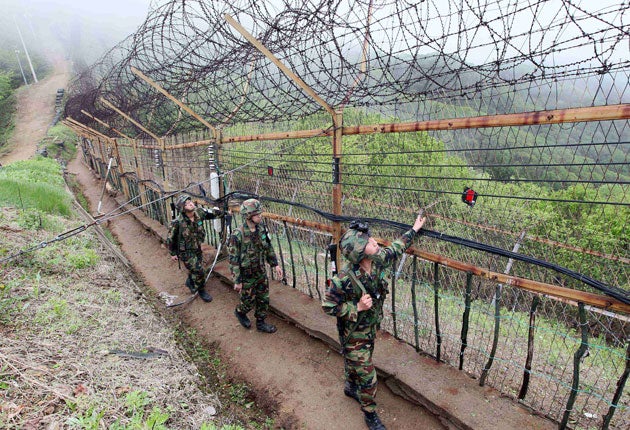South Korea ends trade with North as frigate crisis escalates
Clinton calls on Pyongyang's ally, China, to defuse 'highly precarious' situation

Sanctions, military build-up and the faint but unmistakable drumbeat of war: Koreans woke up today to the reality that life on their divided peninsula has been plunged back to the worst days of the Cold War, even as doubts emerged about the sinking of a South Korean gunboat that sparked this latest crisis.
South Korea's President Lee Myung-bak promised yesterday that Pyongyang would "pay a corresponding price" for its attack on the frigate in March, which killed 46 sailors. Announcing the severing of all trade links with the impoverished North, he told his people in a televised address they had forgotten "that the nation faces the most belligerent regime in the world".
"We have always tolerated North Korea's brutality, time and again," said Mr Lee, who earlier this month chaired the country's first ever joint meeting of his top military commanders.
"We did so because we have always had a genuine longing for peace on the Korean peninsula. But now things are different."
The speech, and Mr Lee's demand for a North Korean apology, follows the publication of a report last week presenting "clear and definitive material evidence" that Pyongyang was behind the gunboat attack. North Korea's government has branded the report a "fabrication" and called yesterday's sanctions an "intolerable, grave provocation".
Meanwhile, UN Secretary-General Ban Ki-Moon said that he expected "measures appropriate to the gravity of the situation" to be taken by the Security Council when South Korea brings the subject to the body's attention. And he told a news conference that the evidence of North Korea's responsibility was "overwhelming and deeply troubling".
The US Secretary of State, Hillary Clinton, was working to persuade China, Pyongyang's sole ally, to line up with Seoul, Washington and their allies in a united front against the isolated Stalinist state in referring the Cheonan's sinking to the Security Council. Mrs Clinton, who is visiting Beijing, called the situation "highly precarious" but said US support for South Korea was "unequivocal".
"We must work together, again, to address this challenge and advance our shared objectives for peace and stability on the Korean peninsula," she said in a speech to the Chinese leadership.
But as tensions ratcheted up, some were already questioning the evidence produced by a team of international investigators that blamed Pyongyang for the 26 March incident. Former unification minister Chung Se-hyun yesterday told the South Korean media that lettering found on the North Korean torpedo that supposedly split the Cheonan frigate in two was not North Korean at all.
Some military experts have questioned whether the 130-tonne Yono class submarine blamed for the attack is capable of firing a torpedo big enough to sink the 1200-tonne Cheonan. Allegations have also surfaced that South Korean and US forces were conducting joint military exercises in the area of the incident, raising the possibility that the Cheonan was sunk by friendly fire from an American submarine.
But investigators from the US, Britain, Australia and Sweden concluded that there was no "other plausible explanation" for what they found. "The evidence points overwhelmingly to the conclusion that the torpedo was fired by a North Korean submarine," said the team.
Mr Lee's decision to end cross-border trade will badly hurt the North, which depends on the South for about 13 per cent of its GDP. All eyes are now on the Kaesong district, a South Korean-funded industrial complex north of the border and one of the remaining symbols of thawing relations between the two sides. Closing the complex, which employs about 1,000 South Koreans and thousands more Northerners, would put the final nail in the coffin of the South's decade-old so-called "sunshine policy" of gradual détente with its prickly neighbour.
Mrs Clinton's visit to China, and South Korea on Wednesday, will further raise the political temperature on the Korean peninsula, which has been one of the world's key flashpoints since the two sides fought each other to a stalemate in the 1950-53 Korean War.
Mr Lee's angry rhetoric yesterday, in marked contrast to his measured response following the frigate attack, is also likely to bring a response in kind from the North. "If our territorial waters, airspace or territory are violated, we will immediately exercise our right of self-defence," Mr Lee said. "Once again, North Korea violently shattered our peace."
Subscribe to Independent Premium to bookmark this article
Want to bookmark your favourite articles and stories to read or reference later? Start your Independent Premium subscription today.

Join our commenting forum
Join thought-provoking conversations, follow other Independent readers and see their replies